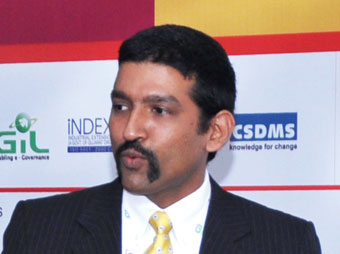
Nivedan Sahani, Vice President and Business Head, Tata Teleservices believes that healthcare industry has been exchanging information, such as medical images and more recently electronic medical records, through local networks
www.tatateleservices.com

 It used to take weeks, months, or even years to plan, procure, and deploy IT infrastructure for connecting embedded medical devices to the network and capture valuable data. Healthcare organisations use ventilators, heart monitors, ultrasound wands, and countless other portable medical devices. Cloud computing solutions can allow emergency room doctors to quickly access a patients history and make better and faster diagnosis.
It used to take weeks, months, or even years to plan, procure, and deploy IT infrastructure for connecting embedded medical devices to the network and capture valuable data. Healthcare organisations use ventilators, heart monitors, ultrasound wands, and countless other portable medical devices. Cloud computing solutions can allow emergency room doctors to quickly access a patients history and make better and faster diagnosis.
Technology infrastructure and medical devices are expensive to deploy in the healthcare industry. The diversity of regulations and existence of myriad life-saving outcomes make the cloud a bit more complicated to embrace than it is in other industries. However, outsourcing bits and pieces of healthcare data services can still be cost-effective solution, one that also leads to improved patient care.
We at the Tata Teleservices are also working on various mobile-based applications that will improve life of rural citizens, and at the same time enable the state government to collect all the relevant data and take faster decisions.

Automation at FPS – GPRS based solution consists of a Blackberry device/ Pos with GPRS connectivity and a bluetooth printer. The handheld device can also be customised with the finger printing option, smart card swipe and barcode reader-writer. The solution, on a handheld device, aims to provide an integrated framework for streamlining the day-to-day activity in National Health Rural Mission (NRHM).
Online data capturing, on a handheld device, is done by ASHA/ANM workers in a local language. This data is collected at the block and district level again and sent to state headquarters where appropriate reports get prepared.
Bridging the Healthcare Gap
Ameera Shah, Managing Director, Metropolis Healthcare says that ICT bridges the gaps in healthcare by bringing about automation in the process of testing and diagnosis
www.metropolisindia.com
 Diagnostic laboratory industry, which is estimated to be of about 10,000 crore in India, is largely fragmented and unorganised. According to estimates, there are about 100,000 pathology laboratories in India of which hardly 200 are accredited. But ten years from now we see this industry consolidating and health insurance industry will drive the growth. About 75 percent of the revenue of Metropolis Healthcare Ltd. comes from Indian markets, while the remaining 25 percent of the revenue comes from international markets.
Diagnostic laboratory industry, which is estimated to be of about 10,000 crore in India, is largely fragmented and unorganised. According to estimates, there are about 100,000 pathology laboratories in India of which hardly 200 are accredited. But ten years from now we see this industry consolidating and health insurance industry will drive the growth. About 75 percent of the revenue of Metropolis Healthcare Ltd. comes from Indian markets, while the remaining 25 percent of the revenue comes from international markets.
ICT bridges the gaps by automating the process of testing. The role of ICT starts from the on-line patient booking to the registration of the sample and then the report gets digitally signed in after the analysis of the sample. Had the entire process been done manually, the possibilities of human errors would have been higher. In Metropolis, we try and avoid manual intervention in the testing process. In future, ICT will play an important role in data mining of information in pathology and diagnostic industry, which is already growing by leaps and bounds.
Diagnostics is an important part of healthcare and thus proper regulations need to be in place.
Be a part of Elets Collaborative Initiatives. Join Us for Upcoming Events and explore business opportunities. Like us on Facebook , connect with us on LinkedIn and follow us on Twitter , Instagram.











